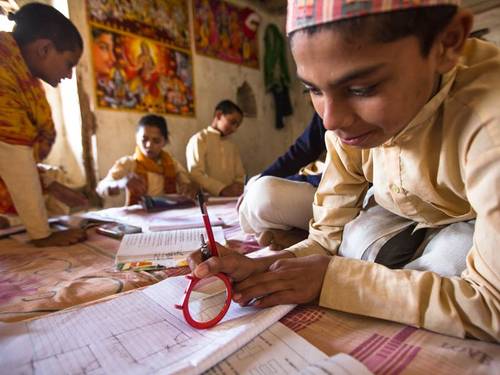International Literacy Day 2015: Literacy and Sustainable Societies
International Literacy Day 2015 celebrated around the world on 8 September to highlight literacy “as a human right, as a force for dignity, and as a foundation for cohesive societies and sustainable development” as the UNESCO Director-General, Irina Bokova, explains in her message for the Day. “Literacy is essential to reach the proposed sustainable development goal to promote ‘inclusive and equitable quality education and lifelong learning for all,” Ms Bokova adds.

Children doing homework at Jagadguru Schoolm, Kathmandu (Nepal)
This year’s main event is the Global Meeting on Literacy and Sustainable Societies. Taking place at UNESCO’s Headquarters in Paris on 8 and 9 September, it is held alongside the International Literacy Prize awards ceremony. Notably participants at the event include the Director-Genera of UNESCO, the Second Vice President of Afghanistan, Mohammad Sarwar Danish, the Minister of Education of Egypt, Moheb Mahmoud Kamel al-Rafei, and United Nations Special Rapporteur on the Right to Education, Kishore Singh, to name but a few.
The Global Meeting brings together nearly 100 United Nations and government representatives, donors, national and international non-governmental organizations, representatives of the private sector and experts from 34 countries to promote youth and adult literacy as a key component of the post-2015 development agenda.
Despite progress worldwide since 2000 when the Education for All (EFA) and the Millennium Development Goals (MDGs) were adopted, some challenges are yet to be overcome. In 2000, the international community pledged to reduce illiteracy rates by 50 per cent by 2015 but, according to the UNESCO Institute for Statistics (UIS), most countries have missed that deadline.
According to the UIS, 757 million adults worldwide, two thirds of them women, still lack basic literacy skills. The number of out-of-school children and adolescents is on the rise, standing at 124 million, and approximately 250 million children of primary school age are failing to master basic literacy skills even while at school. Challenges also exist in high-income countries. According to the European Literacy Policy Network one in five adults in Europe lacks the basic literacy skills to understand the instructions on a medicine bottle.
Participants at the Global Meeting are bringing their contribution to the 2030 vision of literacy, exploring ways to reinforce the interrelations between sustainable development and literacy in light of the Sustainable Development Goals, which will be adopted by the international community at the UN General Assembly Summit later this month.
In the words of the UNESCO Director-General in her Literacy Day message: “We need greater investment and more effective policies to embed action for literacy within wider development policies, supported by innovative mechanisms that generate positive synergies across all policy areas that are vital to building more just and cohesive societies.”
Source: United Nations Educational Scientific and Cultural Organization
- 281 reads
Human Rights
Ringing FOWPAL’s Peace Bell for the World:Nobel Peace Prize Laureates’ Visions and Actions

Protecting the World’s Cultural Diversity for a Sustainable Future

The Peace Bell Resonates at the 27th Eurasian Economic Summit

Declaration of World Day of the Power of Hope Endorsed by People in 158 Nations

Puppet Show I International Friendship Day 2020

